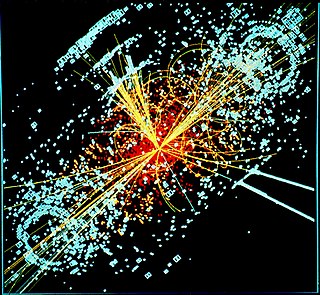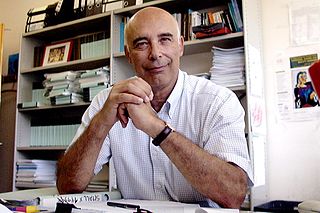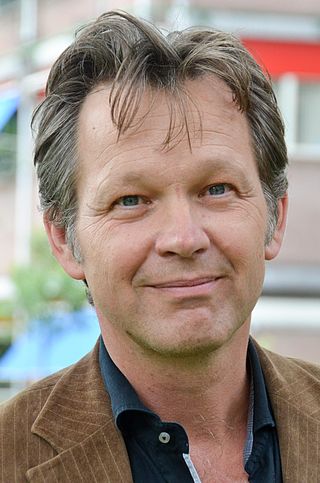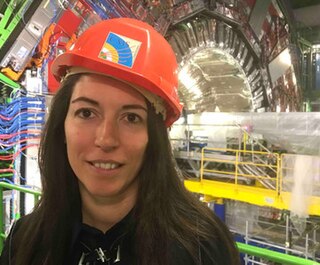
Joseph Johannus Engelen (born 6 July 1950 in Maasniel), a Dutch physicist, was Chairman of the Netherlands Organisation for Scientific Research (NWO) from January 2009 to October 2016. [1] [2]

Joseph Johannus Engelen (born 6 July 1950 in Maasniel), a Dutch physicist, was Chairman of the Netherlands Organisation for Scientific Research (NWO) from January 2009 to October 2016. [1] [2]
Jos Engelen studied physics at the Radboud University Nijmegen where he obtained an MSc degree in 1973. After graduation he worked at the same university as a researcher and lecturer, and gained also his PhD degree here in 1979. From 1979 to 1985 Engelen worked at CERN, the European research centre for particle physics in Geneva, Switzerland. [3]
In 1985, he accepted a position at the Dutch National Institute for Subatomic Physics, Nikhef. He became professor of Experimental Physics at the University of Amsterdam in 1987. At CERN and DESY (Hamburg, Germany) he carried out experiments in the area of the strong interaction, hard photoproduction and dispersion in deep inelastic collisions. [1] [4] He also developed initiatives for research in the field of astroparticle physics. [5]
From 2001 to 2003 Engelen was director of Nikhef and in 2004 he became the Chief Scientific Officer of CERN, a position he held until 2008. [6] [7] His responsibilities included overseeing the construction and commissioning of the new Large Hadron Collider (LHC) particle accelerator and the associated experimental set-ups. From 2007 to 2008 Engelen was chair of ASTRON, the NWO research institute for radio astronomy. [8]

The European Organization for Nuclear Research, known as CERN, is an intergovernmental organization that operates the largest particle physics laboratory in the world. Established in 1954, it is based in Meyrin, western suburb of Geneva, on the France–Switzerland border. It comprises 24 member states. Israel, admitted in 2013, is the only non-European full member. CERN is an official United Nations General Assembly observer.

Jonathan Richard "John" Ellis is a British-Swiss theoretical physicist.

Maria Spiropulu is a Greek particle physicist. She is the Shang-Yi Ch'en Professor of Physics at the California Institute of Technology.

Joseph David Lykken is an American theoretical physicist at the Fermi National Accelerator Laboratory and, from July 1, 2014 to Sept 6, 2022, he was the Deputy Director of Fermilab. He is currently Director of Fermilab's Quantum Division.

The safety of high energy particle collisions was a topic of widespread discussion and topical interest during the time when the Relativistic Heavy Ion Collider (RHIC) and later the Large Hadron Collider (LHC)—currently the world's largest and most powerful particle accelerator—were being constructed and commissioned. Concerns arose that such high energy experiments—designed to produce novel particles and forms of matter—had the potential to create harmful states of matter or even doomsday scenarios. Claims escalated as commissioning of the LHC drew closer, around 2008–2010. The claimed dangers included the production of stable micro black holes and the creation of hypothetical particles called strangelets, and these questions were explored in the media, on the Internet and at times through the courts.

Fabiola Gianotti is an Italian experimental particle physicist who is the current and first woman Director-General at CERN in Switzerland. Her first mandate began on 1 January 2016 and ran for a period of five years. At its 195th Session in 2019, the CERN Council selected Gianotti for a second term as Director-General. Her second five-year term began on 1 January 2021 and goes on until 2025. This is the first time in CERN's history that a Director-General has been appointed for a full second term.
Manfred Lindner is a German physicist and director at the Max Planck Institute for Nuclear Physics in Heidelberg, Germany. He conducts basic research in particle and astro-particle physics.

Gian Francesco Giudice is an Italian theoretical physicist working at CERN in particle physics and cosmology.

Sir Tejinder Singh Virdee,, is a Kenyan-born British experimental particle physicist and Professor of Physics at Imperial College London. He is best known for originating the concept of the Compact Muon Solenoid (CMS) with a few other colleagues and has been referred to as one of the 'founding fathers' of the project. CMS is a world-wide collaboration which started in 1991 and now has over 3500 participants from 50 countries.

Peter Jenni, is an experimental particle physicist working at CERN. He is best known as one of the "founding fathers" of the ATLAS experiment at the CERN Large Hadron Collider together with a few other colleagues. He acted as spokesperson of the ATLAS Collaboration until 2009. ATLAS is a world-wide collaboration which started in 1992 involving roughly 3,000 physicists at 183 institutions in 38 countries. Jenni was directly involved in the experimental work leading to the discoveries of the W and Z bosons in the 1980s and the Higgs boson in 2012. He is (co-)author of about 1000 publications in scientific journals.

Guido Altarelli was an Italian theoretical physicist.
Sigfried Bethke is a German physicist and science manager.

Nikhef is the Dutch National Institute for Subatomic Physics that performs research in particle physics and astroparticle physics. Amongst others, it is a research partner of the CERN institute in Switzerland and a member of the European Gravitational Observatory. Nikhef is a collaboration between the Dutch Research Council (NWO), University of Amsterdam, Vrije Universiteit Amsterdam, Radboud University, University of Groningen, Maastricht University and Utrecht University. The current director is Stan Bentvelsen. Nikhef is located at the Amsterdam Science Park in Watergraafsmeer in the Netherlands.

Yaşar Önel is a Turkish-born physicist who holds Swiss and American citizenship. He received his Ph.D. in Physics from London University in 1975. He worked at the Queen Mary University of London in the United Kingdom, and Neuchatel and Geneva Universities in Switzerland before joining the University of Texas at Austin in 1986. Then, he moved to the University of Iowa in 1988. He is a tenured faculty professor. of Physics at the University of Iowa in Iowa City, IA, USA.

Stanislaus Cornelius Maria (Stan) Bentvelsen is a Dutch physicist. He is the director of Nikhef since 2014.

Ursula Rita Bassler is a French-German particle physicist. Bassler was the President of the CERN Council from 2019 to 2021, and deputy director of National Institute of Nuclear and Particle Physics (IN2P3), CNRS, from 2014 to 2015.

Felicitas Pauss is an Austrian physicist. She was elected Professor for Experimental Particle physics at ETH Zurich, Switzerland, in 1993. Her research activities concentrated on two main research fields: particle physics at the high-energy frontier and astroparticle physics, addressing fundamental open questions about the structure of the Universe and the underlying mechanisms that govern its evolution.
Oliver Buchmueller is a scientist and professor of physics at the Faculty of Natural Science, Imperial College London. Buchmueller is presently serving as one of the lead scientists on the Compact Muon Solenoid experiment at CERN’s Large Hadron Collider, the principal investigator of the Atom Interferometer Observatory and Network and also one of the lead authors at Atomic Experiment for Dark Matter and Gravity Exploration in Space (AEDGE). Previously he has been associated with the ALEPH experiment at CERN’s LEP collider and the BaBar experiment at SLAC. Buchmueller was among the group of scientists responsible for the discovery of Higgs Boson particle at the LHC, CERN and later in the scientific exploration to find the traces of dark matter through the LHC.

Egil Sigurd Lillestøl was a Norwegian experimental elementary particle physicist.

Florencia Canelli is since 2021 the appointed Swiss scientific delegate to the CERN council, the supreme decision-making authority of the CERN Organization. From 2021-2024, she was appointed chair of the IUPAP division of particles and field (C11). From 2021-2023, she was co-coordinator of the physics program of the CMS collaboration, a CERN experiment with over 3000 physicists. In 2010, Canelli was awarded the IUPAP Young scientist prize, an international prize awarded to one experimental and one theoretical physicist per year, for "her pioneering contribution to the identification and precision measurements of rare phenomenon through the use of advanced analysis techniques to separate very small signals from large background processes at the Tevatron collider." She has been an author on four multi-purpose collider experiments, namely the CMS experiment and ATLAS experiment at the CERN LHC, and the CDF experiment and D0 experiment at the Fermilab Tevatron. She is currently a full professor at the University of Zurich, Physics Institute, specializing in particle physics.